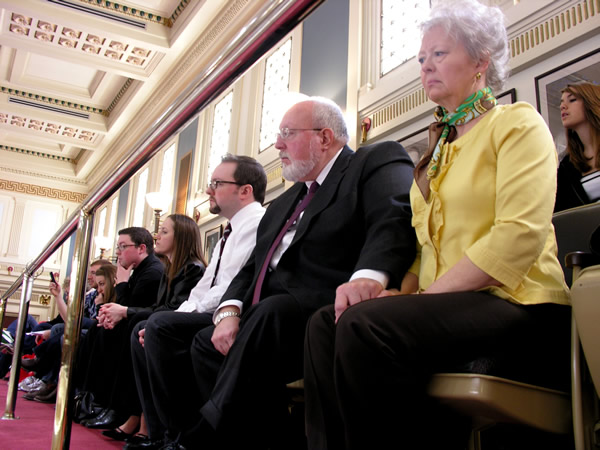Senate gives unanimous approval to Erin Swezey Act
 Members of the Swezey family watched from the gallery as Senate Bill 529 was introduced in the Senate Chamber on Tuesday.
Members of the Swezey family watched from the gallery as Senate Bill 529 was introduced in the Senate Chamber on Tuesday.
A bill to reduce Oklahoma’s drunk driving fatalities has cleared the Senate and is on its way to the House of Representatives. Dixie and Keith Swezey, of Edmond, and other family members watched from the Senate Gallery as lawmakers voted unanimously for Senate Bill 529, the Erin Elizabeth Swezey Act. The bill is named for the Swezeys’ 20-year-old daughter, Erin, who was killed by a drunk driver in 2009.
Sen. Clark Jolley, R-Edmond, is principal author of SB 529, which is authored by Rep. Jason Nelson, R-Oklahoma City, in the House. Jolley and the Swezeys met with reporters shortly after Tuesday’s passage of the measure.
“We’re trying to keep drunk drivers off the road. That is our purpose. Today was a significant step towards that direction. I’m very honored to serve in a body that agreed with that principle and moved that public policy forward,” Jolley said “I want to thank publicly all the members of the State Senate today who gave their voice of support for this bill.”
As approved by the full Senate, the measure would require an interlock ignition device for two years for a first-time DUI conviction. On a second offense, the device would be required for five years. Subsequent offenses would mandate the use of an interlock device for eight years. Some Senators voiced concerns because the bill required the words “DUI Conviction” to be branded on the person’s driver license. Jolley accommodated those members by amending the bill so that instead, the words “Interlock Required” would be on the individual’s license for as long as they were required to have an interlock device.
“Our goal is not to stigmatize those who are convicted of drunk driving—it’s to make sure they are not driving while drunk,” Jolley said.
The Swezeys thanked Jolley and the Senate for passage of the measure, and urged the House to join in supporting the Erin Swezey Act.
“Oklahoma is one of the top six states in deaths from DUI accidents. That’s not a distinction we want. This bill would stop that. In every state that has a law like this—13 states so far—drunk driving deaths have dropped by at least 30 percent. In Arizona they’ve dropped 46 percent,” said Keith Swezey. “Oklahoma needs to join the ranks of those states.”
 Oklahoma Senate
Oklahoma Senate

